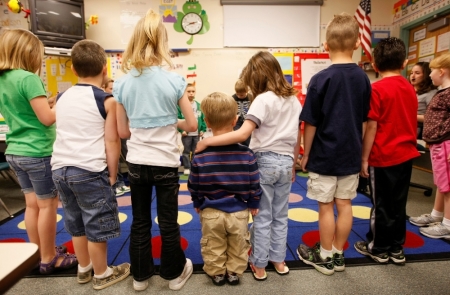Religious groups warn Build Back Better Act threatens faith-based child care, education

A coalition of Christian, Jewish and Muslim organizations is expressing concern about the impact President Joe Biden’s Build Back Better bill may have on faith-based child care and education services.
Nearly two dozen faith leaders and religious groups signed onto a letter sent to leaders in both houses of the U.S. Congress Wednesday, outlining their concerns with Biden’s massive social spending bill.
The Build Back Better Act has become one of Biden’s top domestic priorities. The legislation has passed the Democrat-led House of Representatives, but its future remains uncertain in the more divided Senate.
The letter warned about the impact of the Build Back Better bill on the religious liberty of faith-based organizations and the services they provide.
“Expanding affordable child care and pre-kindergarten is a worthy goal to help working
families,” the Dec. 1 letter reads. “However, the current child care and universal pre-kindergarten (UPK) provisions in the Build Back Better Act will suppress, if not exclude, the participation of many faith-based providers; and faith-based providers are what more than half of American families choose for child care.”
Among the signatories of the letter are Catholic Charities USA, two committees of the U.S. Conference of Catholic Bishops, the Council of Christian Colleges of Universities, the National Association of Evangelicals, the Southern Baptist Convention’s Ethics & Religious Liberty Commission, the Union of Orthodox Jewish Congregations of America and the Council of Islamic Schools in North America.
The letter clarifies that “while language in the BBBA does not preclude parents from selecting sectarian providers, the subsequent provisions in the bill make it virtually impossible for religious providers to participate.”
Specifically, the letter says the bill “defines all providers as recipients of federal assistance, whether the funds come via certificates (in the child care program) or direct grants (in the pre-kindergarten program).”
“Making faith-based providers of child-care and pre-kindergarten into recipients of federal financial assistance triggers federal compliance obligations and non-discrimination provisions,” the letter noted.
The faith groups characterized this aspect of the Build Back Better Act as “an explicit departure from current policy governing the federal Child Care and Development Block Grant (CCDBG), in which faith-based providers participate with religious liberty protections intact, and in which providers are explicitly not recipients of federal financial assistance.”
“[T]he BBBA applies nondiscrimination requirements to both the child care and universal pre-kindergarten sections that do not generally attach to FFA,” the letter states, adding that it “applies Head Start’s non-discrimination provisions to the entire child chare and UPK programs regardless of whether a provider is a Head Start provider.”
Head Start’s nondiscrimination provisions prohibit discrimination based on sex, creed and belief, much like Title VII of the Civil Rights Act of 1964 and Title IX of the Education Amendments of 1972.
The signatories allege that the Build Back Better Act applied Head Start’s nondiscrimination provisions to child care and universal pre-kindergarten programs. While “both Title VII and Title IX contain carefully crafted exemptions for religious organizations,” Head Start’s nondiscrimination provisions have “no exemption.”
If subjected to Head Start’s nondiscrimination provisions, faith-based child care providers could be forced to embrace curricula or teaching that goes against their sincerely held religious beliefs regarding sex and gender or lose federal funding.
Title VII and Title IX exemptions not present in Build Back Better also allow faith-based child care providers to give preferential treatment to those who share their religious beliefs in hiring decisions.
The faith leaders cited another aspect of the Build Back Better Act, which requires existing universal pre-K programs at the state level to fold into the national program established by the new law and abide by the BBBA’s terms.
“This threatens to remove faith-based providers from successful, existing state programs that are more protective of faith-based providers’ autonomy than the BBBA,” the faith groups assert.
“Our concerns do not represent a desire to exclude anyone from faith-based early learning,” they stressed. “Faith-based providers strive to serve everyone, especially the less fortunate, whom the BBBA’s child care and UPK programs are specifically intended to benefit. We simply asked to be allowed to continue our good work in caring for our nation’s children in a manner consistent with our beliefs.”
The letter concludes that “the faith community has always affirmed that parents should choose the best environment for care and education of their children” and warns that “the current Build Back Better Act provisions would severely limit the options for parents, suffocate the mixed delivery system for child care and pre-kindergarten, and greatly restrict the number of providers available for a successful national program.”
The letter includes proposed amendments to clarify that child care certificates do not constitute federal financial assistance, that religious entities receiving child care certificates will be subject to religious exemptions and model the funding structure for BBBA’s universal pre-K program after the Child Care and Development Block Grant.
Last month, the bill passed the U.S. House of Representatives on a largely party-line vote. It has not come up for a vote in the Senate due to unanimous opposition from Republicans and concerns from some Democrats about the price tag of the social spending package and its potential to worsen inflation.
According to the nonpartisanCongressional Budget Office, the bill would add $160 billion to the national debt in the next decade.
Ryan Foley is a reporter for The Christian Post. He can be reached at: ryan.foley@christianpost.com





















